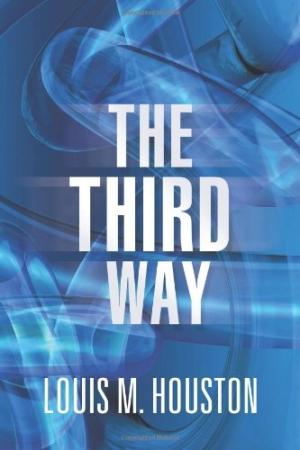The Third Way
Lose the noise, focus on inner balance, says scientist who challenges us all to open our minds.
A complex project that uses scientific language to present a comprehensive philosophy, The Third Way makes a compelling case for pursuing intellectual efficiency by minimizing needless internal noise. This latest book from research scientist Louis M. Houston offers guidelines for intellect-centered living, a so-called “third way.”
Classical, or first and second, ways consider emotional order or physical order alone. Houston suggests that those other, less encompassing paths often bog their travelers down in dualities—in convictions that good and evil, or thought and emotion, are necessarily warring concepts, and that one must take a side. But, he insists, such concepts can actually work in concert with one another.
Houston takes such binaries and asserts that their poles, rather than existing in opposition to one another, should be “allowed to interact,” via meditation and concentration. If binaries survive the anticipated clash, they should be embraced as “neutral clusters,” as sources of positive energy.
When we approach neutral clusters in a balanced manner, Houston says, we can work toward a meta-positivity, a balanced, logic-driven state which has outward implications. Suggesting that all is part of the universal whole, and that all which we think and do affects the whole, Houston says that meta-positivity is the key to personal and external balance: “We must understand that we are essentially a collection of ideas,” he asserts, and “how well we survive and hopefully thrive is dependent on how those ideas interact with each other and with the environment.”
The project draws from Eastern religion and philosophy (yin/yang is presented alongside Buddhist concepts, such as the turmoil caused by attachment) as well as Houston’s scientific background (concepts like inertia, Newton’s laws, and heat and conduction are included). This results in an interesting, if not always intuitive, balance.
These pages often move swiftly between broad topics. From physics and superconductivity, to psychology, to meditation and explanations of tenets of Western religions, the shifts do not always seem fluid. The free-association section which arises late in the book—its pages declaring “reality is empty” alongside ideas like “meaning is energy” and “truth has no velocity because it does not change”—will test the reader’s trust with its expectations of assent to oblique ideas.
Embracing the third way requires intentional open-mindedness, and Houston insists that positive-energy thoughts “will [ultimately] prevail.” The promotion of pure knowledge, which runs throughout, is sympathetic. But these precise paths, “various and sundry” as they remain, despite being presented under the tent of intellectual efficiency, may resist easy adoption.
In all, The Third Way is a well-intentioned attempt to address personal and communal discord.
Reviewed by
Michelle Anne Schingler
Disclosure: This article is not an endorsement, but a review. The publisher of this book provided free copies of the book and paid a small fee to have their book reviewed by a professional reviewer. Foreword Reviews and Clarion Reviews make no guarantee that the publisher will receive a positive review. Foreword Magazine, Inc. is disclosing this in accordance with the Federal Trade Commission’s 16 CFR, Part 255.

